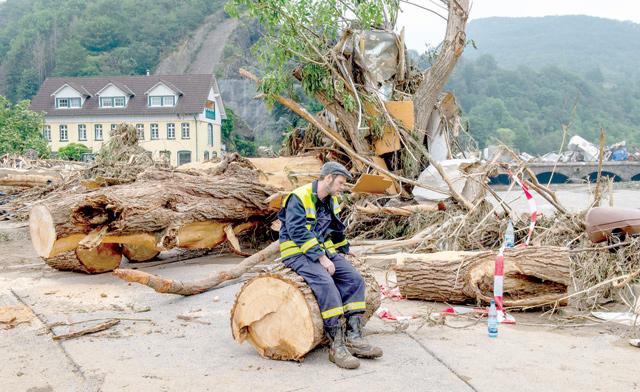- Local News
- Sun-2021-07-18 | 06:22 pm

Nayrouz News Agency :
Rescue workers scrambled Saturday to find survivors and victims of the devastation wreaked by the worst floods to hit western Europe in living memory, which have already left more than 150 people dead and dozens more missing.
Western Germany has suffered the most brutal impact of the deluge that also pummelled Belgium, Luxembourg and the Netherlands, leaving streets and homes submerged in muddy water and isolating entire communities.
With the death toll in Germany at 133, three days into the disaster, rescuers said far more bodies were likely to be found in sodden cellars and collapsed homes.
"We have to assume we will find further victims," said Carolin Weitzel, mayor of Erftstadt, where a landslide was triggered by the floods.
In Germany's worst-hit states of North Rhine-Westphalia and Rhineland-Palatinate, residents who fled the deluge were gradually returning to their homes and scenes of desolation on Saturday.
"Within minutes, a wave was in the house," baker Cornelia Schloesser told AFP of the torrents that arrived in the town of Schuld, carrying her century-old family business with them.
"It's all been a nightmare for 48 hours, we're going round in circles here but we can't do anything," she said, surveying the heaps of twisted metal, broken glass and wood that have piled up at her former storefront.
In neighbouring Belgium, the death toll jumped to 24 with many people still missing.
Prime Minister Alexander de Croo was heading for the scene of what he has called "unprecedented" flood damage in the Meuse river basin. He has declared Tuesday a day of official mourning.
Luxembourg and the Netherlands were also hammered by heavy rains, inundating many areas and forcing thousands to be evacuated in the city of Maastricht.
'Immense' task
A burst dam in Germany's Heinsberg district 65 kilometres southwest of Duesseldorf overnight prompted the emergency evacuation of more than 700 residents.
In some affected areas, firefighters, local officials and soldiers, some driving tanks, have begun the colossal work of clearing the piles of debris clogging the streets.
"The task is immense,” said Tim Kurzbach, mayor of Solingen, a city in the south of the Ruhr area.
The real scale of the disaster is only now becoming clear, with damaged buildings being assessed, some of which will have to be demolished, and efforts under way to restore gas, electricity and telephone services.
The disruption to communication networks has complicated efforts to assess the number still missing, and most roads in the submerged Ahr Valley are out of service.









